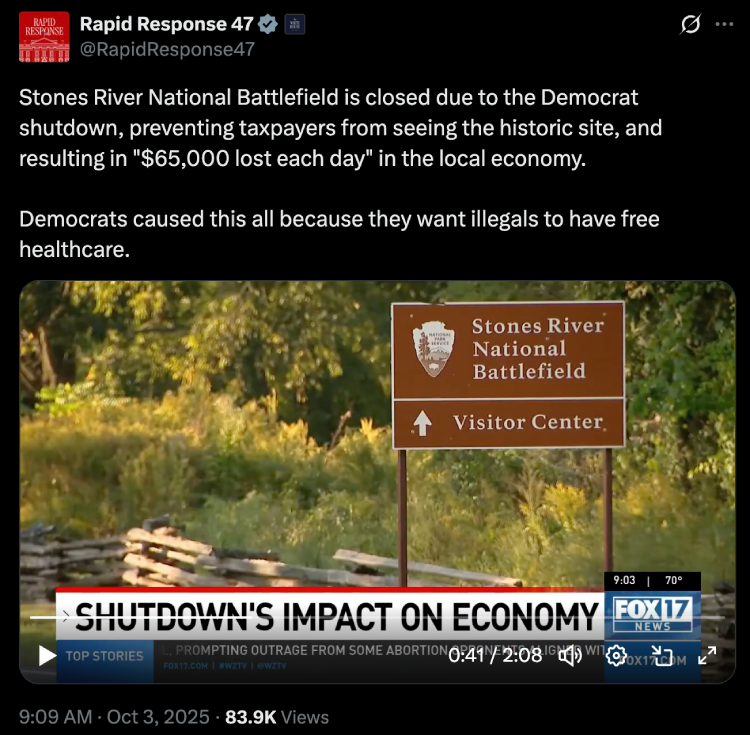
Introduction
A social media post from “Rapid Response 47” makes sweeping claims about Stones River National Battlefield’s closure, attributing it to a “Democrat shutdown” driven by healthcare policy for undocumented immigrants. This narrative demands scrutiny—not just of the facts, but of the political framing designed to inflame rather than inform.
The Factual Landscape
National Park Closures During Shutdowns
Federal government shutdowns occur when Congress fails to pass appropriations bills, forcing non-essential federal operations to cease. National Park Service sites—including battlefields like Stones River—typically close or operate with skeleton staffs during these lapses.
Critical context: Government shutdowns require both chambers of Congress and the President to reach impasse. The claim of a “Democrat shutdown” assumes sole responsibility lies with one party—a designation that oversimplifies the constitutional reality of divided government powers.
The $65,000 Daily Economic Impact
The specific figure of “$65,000 lost each day” deserves examination:
- Source verification: The post provides no citation for this number. Is it from a Chamber of Commerce study? A Park Service estimate? Local business surveys?
- Baseline questions: Does this represent visitor spending, lost park revenue, or broader economic ripple effects?
- Context matters: Stones River receives approximately 300,000 visitors annually—roughly 820 per day. A $65,000 daily impact would require nearly $80 in economic activity per visitor, which while possible, needs substantiation.
Without source documentation, this figure functions more as emotional leverage than verified data.
Deconstructing the Healthcare Claim
The Allegation
The post asserts Democrats caused the shutdown “because they want illegals to have free healthcare.” This requires unpacking on multiple levels:
1. Shutdown Causation Is Complex
Modern government shutdowns have stemmed from disputes over:
- Border wall funding (2018-2019)
- Debt ceiling negotiations
- Overall spending levels
- Specific policy riders attached to appropriations bills
Attributing any shutdown to a single policy demand—particularly one as specific as “free healthcare for illegals”—misrepresents how appropriations deadlocks actually develop.
2. The Healthcare Policy Reality
Federal appropriations battles rarely center on undocumented immigrant healthcare access because:
- Emergency Medicaid already covers emergency treatment regardless of status (established under Reagan)
- Most undocumented immigrants are already ineligible for federal healthcare programs
- State-level programs vary, but aren’t typically part of federal shutdown disputes
3. The Rhetorical Strategy
Using “illegals” rather than “undocumented immigrants” and framing healthcare as “free” (ignoring emergency room cost-shifting) reveals this as political messaging rather than policy analysis. The construction is designed to trigger emotional responses about worthiness and resource allocation.
The Broader Pattern: Shutdown Blame Attribution
Historical Context
Every modern shutdown has featured both parties claiming the other is responsible:
- 2013: Republicans blamed Obama over ACA; Democrats blamed GOP for using funding as leverage
- 2018-2019: Trump claimed ownership, then blamed Democrats; Democrats blamed Trump’s wall demands
- 2023: Various disputes over spending levels and policy riders
The actual answer to “who caused it” depends on which policy position you believe should have prevailed—a fundamentally political judgment, not an objective fact.
The Accountability Question
Constitutional scholars note that shutdown blame is inherently muddy because appropriations require:
- House passage
- Senate passage
- Presidential signature
When these three institutions are controlled by different parties or factions, declaring one side solely responsible is political spin, not constitutional analysis.
What’s Missing From This Narrative
Omitted Context
- Which shutdown? The post doesn’t specify when this occurred or provide current context
- Negotiation details: What were the actual sticking points? What did each side propose?
- Local voices: No quotes from Murfreesboro businesses, park rangers, or Tennessee officials
- Historical precedent: How does this compare to previous closures of this site?
Questions a Journalist Would Ask
- Who exactly is “Rapid Response 47”? Is this an official campaign account, PAC, or partisan operative?
- Can the $65,000 figure be independently verified?
- What was the actual policy dispute that led to this specific closure?
- Have there been bipartisan efforts to keep parks open during shutdowns?
The Methodology of Partisan Framing
This post exemplifies several propaganda techniques:
1. Simplified causation: Complex multi-party negotiations reduced to “Democrats want X” 2. Economic weaponization: Local impact figures (sourced or not) as emotional ammunition
3. Cultural wedge issues: Immigration and healthcare combined to maximize tribal response 4. Passive harm: Taxpayers portrayed as victims of the other side’s ideological obsessions
Conclusion: Beyond the Binary
The truth about government shutdowns resists partisan soundbites:
- Both parties use appropriations as leverage for policy priorities
- Shutdown blame depends more on your political priors than constitutional clarity
- Local communities suffer regardless of which party you blame
- Nuanced reporting requires asking who benefits from oversimplified narratives
Stones River National Battlefield—where Americans killed Americans in 1862-63—deserves better than becoming another casualty in our modern political warfare. The site commemorates what happens when democratic disagreement collapses into absolute enmity.
Perhaps the real question isn’t which party caused this closure, but why we’ve normalized using government shutdowns as negotiating tactics at all—and why partisan operatives can count on simplified blame narratives finding eager audiences.
A seasoned investigative journalist’s takeaway: When political claims arrive pre-packaged with villains, victims, and convenient dollar figures, your first instinct shouldn’t be to share—it should be to investigate.
